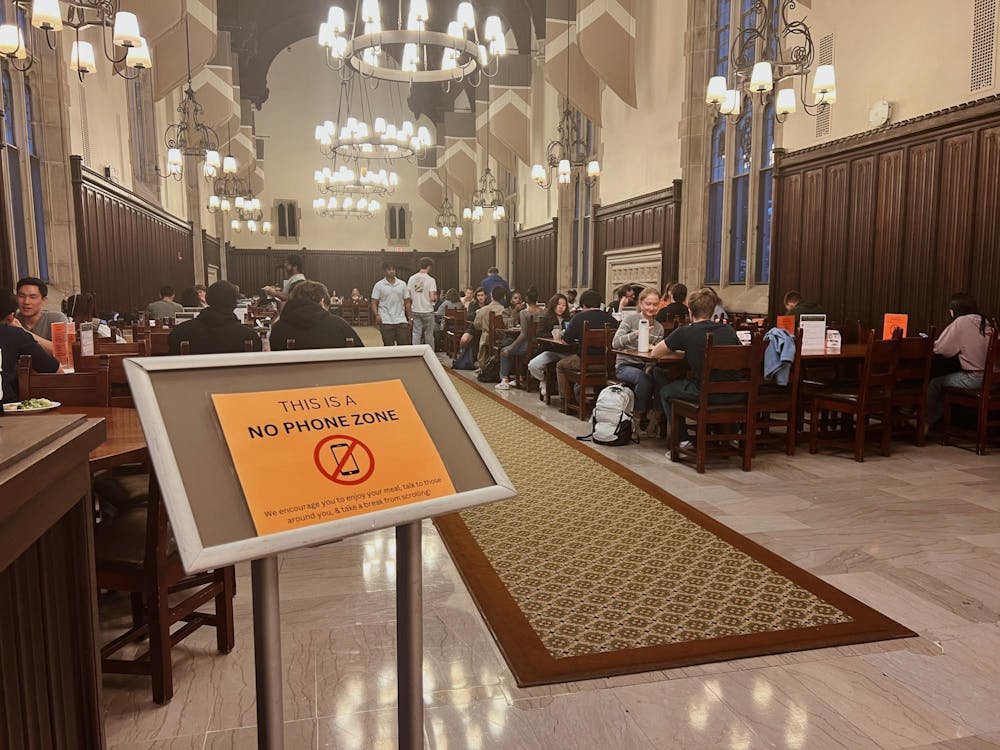Upon graduation, Princeton students often reflect that they wish they had more time to spend with their friends and would give anything to have just one more year of college. What many may not realize is that every Princeton student essentially does have an extra year of college — depending on how they use it. According to several studies, the average college student spends six to eight hours per day on their phone.
Using a conservative six hour per day estimate, that means a typical Princeton student devotes one-fourth of their twenty-four hour day to screen time. Over a four-year college experience, this adds up to one full year spent looking at their phone.
Cell phones have changed from being tools that connect us to people far away to devices that disconnect us from those that we are with: addictive social media and short-form video apps are increasingly pulling us away from real-world experiences.
In order to mediate and begin to eliminate this, we need to do two things. First, realize the magnitude of what is happening — a whole year out of four lost — and second, prioritize reducing certain times of phone usage, especially to ensure that social time is never replaced by phone time.
As individuals, and as a community, we need to be mindful about our time on our phones, and ensure that it doesn’t take away from valuable social interactions and meaningful experiences. As we spend less time on our phones, we should make a collective effort to prioritize immediate social connection and being present with the people around us.
Professor of History D. Graham Burnett ’93 and Peter Schmidt ’20 recently wrote a column explaining how the advanced technology and strategic design employed by technology companies has made it increasingly difficult to resist the pull of social media apps. The unfortunate result of this is an increasingly isolated campus, where people spend more time on their phones, and less time engaged with the people around them.
Of course, not all use of social media is problematic — in fact, it is often beneficial. Social media often provides informative and entertaining content, and connection with those far away.
But when phone time takes away from in-person social connection, it becomes problematic. This means we should be particularly attentive to how we use these apps in social settings.

Some residential colleges on campus have started pilot programs to address this concern and reduce phone usage at meals: Rockefeller College recently implemented a new “No Phone Zone” at four tables in the Rockefeller-Mathey (RoMa) dining hall. Additionally, Butler College is hosting “Butler Unplugged” nights from 6–7 p.m. on Wednesday nights.
As a recent ‘Prince’ article observed, when the reporter “visited the ‘No Phone Zone’ tables in Rocky’s dining hall at 6:15 p.m. on Wednesday Sept. 25, three out of four tables were occupied by just one student, all three of whom were scrolling on their cellphones.” While ironic that this occurred at a supposedly phone-free place, this happens all over campus.
In an environment where 67 percent of college students are feeling “isolated,” according to a recent National College Health Assessment, engaging with others instead of using our phones can be a helpful antidote. But the scene in Rocky’s “No Phone Zone” demonstrates that these programs are only as successful as students make them. It is admittedly easier to put ourselves in a bubble — using our phones to shield us from uncomfortable social interactions. However, by only using our phones, we miss out on opportunities to engage with those around us.
Although Burnett and Schmidt are right that companies are modifying our behavior and making phone use addictive, making the conscious effort to put our phones down and interact with the people around us is ultimately a personal choice. Changing deeply-ingrained habits and minimizing the use of addictive technology are not easy and take a lot of practice.

The challenge of bringing our attention and focus back to the people around us is one that we must take on. Ultimately, the way that we grow as individuals and collectively solve the tough issues of today and tomorrow comes from face-to-face interaction and collaboration.
We have been conditioned to pull out our phones whenever we are bored or experience even a fleeting moment of social silence. Instead, how much more could we benefit from talking to somebody new, taking a walk around our beautiful campus, or picking up a book — for fun!
It isn’t easy, but it is something that we can confront to improve our own lives and enrich the entire campus community. We are fortunate at Princeton to be surrounded by some of the brightest, most diverse, and ambitious young minds in the world. We should get out of our phones and engage with them.
The next time you take your phone out, perhaps stop and think about what you could do with a whole extra year of your Princeton experience. Remember, we only have four years.
Jackson Baldrate is a sophomore contributing writer from McLean, Virginia intending to major in economics. He can be reached by email at jb1837[at]princeton.edu.








